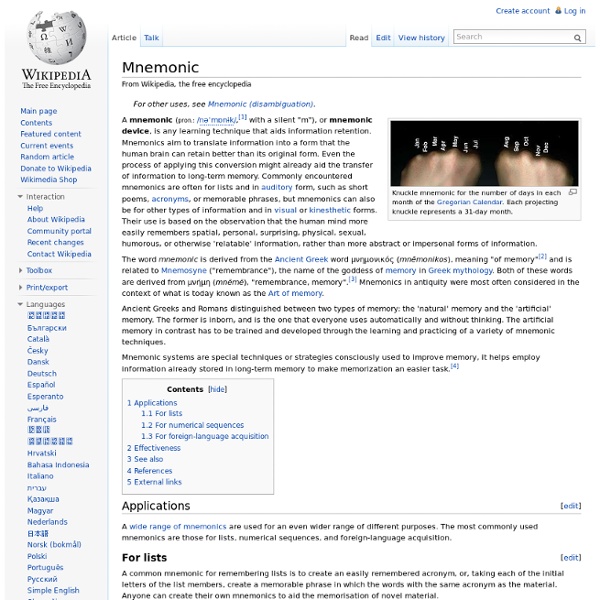Mnemonic

List of mnemonics
This article contains lists of some common mnemonics. Art[edit] To remember the Elements of Art: Space, Form, Texture, Shape, Line, Value, Color. Spaceships Fly Through Space Looking Very CoolThe Fat Cat Sings Songs Very Loudly Astronomy[edit] My Very Easy Memory Jingle Seems Useful Naming Planets My Very Educated Mother Just Served Us Nachos Many Very Educated Men Justify Stealing Unique Ninth obsolete: My Very Earnest Mother Just Showed Us Nine Planets My Very Easy Method Just Speeds Up Naming Planets[1] My Very Educated Mother Just Served Us Nine Pies Mary Visits Every Monday Just Stays Until Noon Period My Very Educated Mother Just Said Uh-oh! In Have Spacesuit Will Travel, Robert A. Biology[edit] Business and Economics[edit] To remember the American Institute of Certified Public Accountants (AICPA) "Principles of Professional Conduct" from the "Code of Professional Conduct" (Responsibility, The Public Interest, Integrity, Objectivity and Independence, Due Care, Scope and Nature of Services):
Active recall
Active recall exploits the psychological testing effect and is very efficient in consolidating long-term memory.[3] Research revealed that it is the quickest, most efficient, and effective way to study written materials, at least for factual and problem-solving tests.[1] Aside from passive review, it is said to be better than mindmapping and note-taking since it is extremely efficient for committing details and ideas into one's memory.[2] It is also suggested that the neocortex has an active recall that can use episodic information to build new semantic memories, which could mean the hippocampus plays a role in the way memories are consolidated in the neocortex.[4] Information retrieval and learning[edit] A study done by J.D. Karpicke and H.L. Karpicke and Janell R. McDaniel et al. (2009) came up with the 3R (read-recite-review) method for learning from textbooks. Some critics of active recall claim that using retrieval techniques only improves learning a specific response. See also[edit]
John Amos Comenius
Czech teacher, educator, philosopher and writer Comenius introduced a number of educational concepts and innovations including pictorial textbooks written in native languages instead of Latin, teaching based in gradual development from simple to more comprehensive concepts, lifelong learning with a focus on logical thinking over dull memorization, equal opportunity for impoverished children, education for women, and universal and practical instruction. He also believed heavily in the connection between nature, religion, and knowledge, in which he stated that knowledge is born from nature and nature from God.[5] Besides his native Moravia,[6][7] he lived and worked in other regions of the Holy Roman Empire, and other countries: Sweden, the Polish–Lithuanian Commonwealth, Transylvania, England, the Netherlands and Hungary. Life and work[edit] After his religious duties, Comenius's second great interest was in furthering the Baconian attempt at the organization of all human knowledge.
Related:



